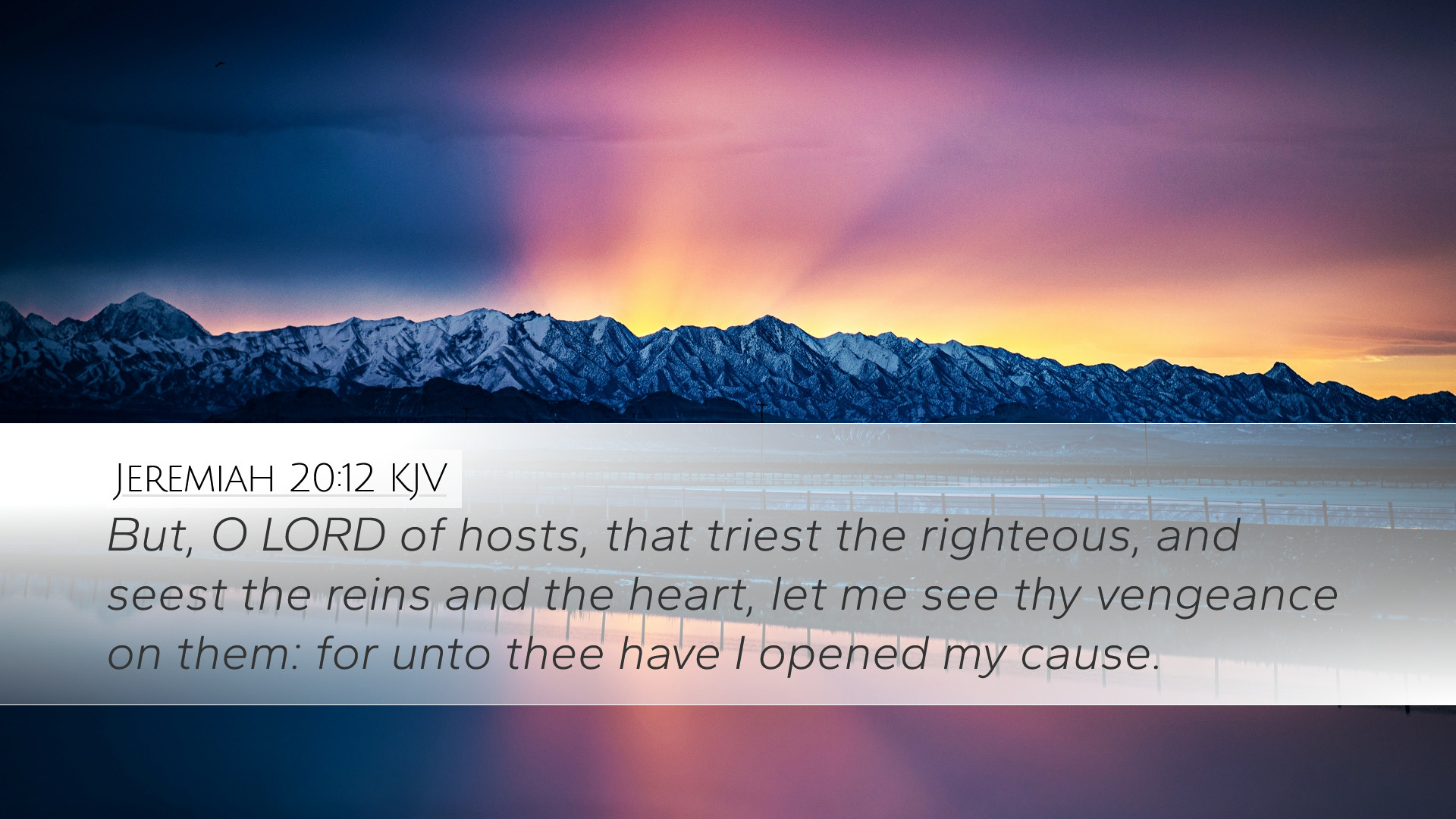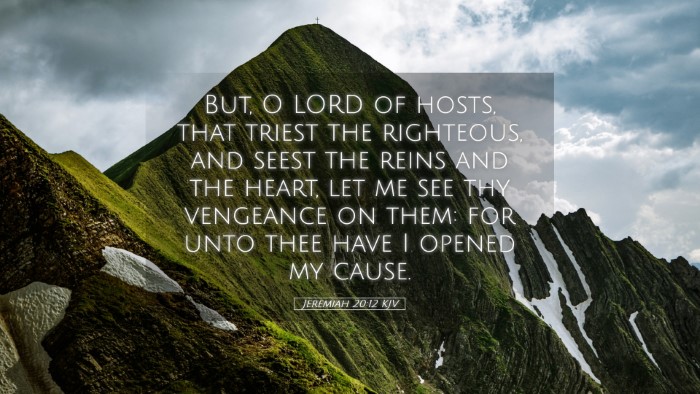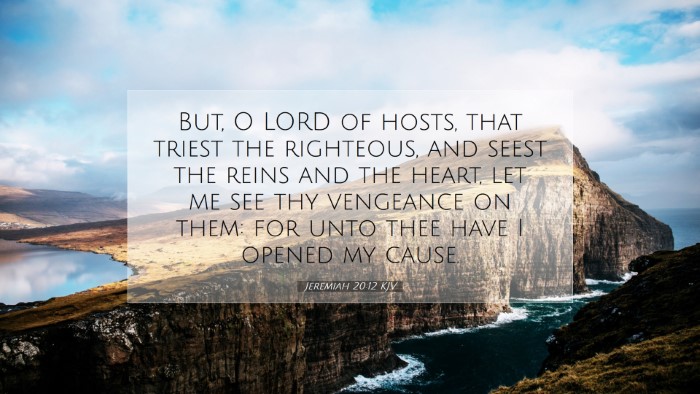Bible Commentary on Jeremiah 20:12
Jeremiah 20:12 states: "But, O Lord of hosts, that triest the righteous, and seest the reins and the heart, let me see thy vengeance on them: for unto thee have I opened my cause." This verse captures the anguish and resolve of the prophet Jeremiah as he seeks divine intervention against his foes.
Contextual Analysis
This verse is situated within a larger context of persecution and prophetic despair. Jeremiah finds himself besieged by adversaries, both from his own people and those who oppose God’s message. Understanding this context is crucial as it showcases the emotional and spiritual struggle of a servant chosen to deliver an unwelcome message of judgment and correction.
Insights from Public Domain Commentaries
Matthew Henry
Matthew Henry provides a poignant examination of Jeremiah's plea for justice. He states that this prayer illustrates the soul's cry for vindication in the midst of suffering. Henry emphasizes that Jeremiah acknowledges God's role as the ultimate righteous judge, reminding readers that true justice will be meted out by the Lord.
- The Righteousness of God: Henry notes that God's omniscience, as the one who "triest the righteous," ensures that justice prevails. Jeremiah, aware of his own integrity, appeals to God’s fidelity to righteousness.
- Emotional Plea: This appeal is steeped in Jeremiah's deep anguish. He processes his suffering, drawing attention to the inner workings of his heart, which God alone can discern.
- The Call for Vengeance: Henry discusses the appropriateness of asking for divine retribution, positioning it within a theological framework that understands God’s justice as necessary for the vindication of His prophets.
Albert Barnes
Albert Barnes offers a practical perspective on the verse, pointing out the duality of concern for justice and the prophet’s personal suffering. Barnes emphasizes the importance of transparency in one's relationship with God, suggesting that Jeremiah's open appeal displays an intimate trust in God's plan.
- Trust in God’s Justice: Barnes reflects on the phrase "let me see thy vengeance," indicating that while vengeance belongs to the Lord, the faithful may expect to witness God's justice in response to unrighteousness.
- The Role of the Prophet: He elaborates on Jeremiah’s role as a mediator between God and the people, suggesting that his anguish is not just personal but a reflection of the collective suffering of Israel under judgment.
- Encouragement for Believers: Finally, Barnes reassures that believers today can also bring their grievances before God with the assurance that He sees all and will act accordingly.
Adam Clarke
Adam Clarke delves into the specifics of the phraseology in Jeremiah 20:12, noting the depth of Jeremiah’s emotional state. He interprets this cry as not just a request for vengeance but as a declaration of faith in God's ultimate control over earthly affairs.
- Tries the Righteous: Clarke elucidates that "God tries the righteous" suggests that suffering has a purpose, serving as both a test and a means to refine character.
- Seeing the Heart: Clarke highlights the assurance that God sees the "reins and the heart," underscoring the significance of inner integrity over outward appearances.
- Human Response to Suffering: He encourages believers to communicate openly with God about their pain and frustrations, reinforcing that God's faithful character provides a sanctuary for our struggles.
Theological Implications
The theological implications of Jeremiah 20:12 are profound, touching on themes of divine justice, the prophet's role, and the relationship between suffering and faith. These insights remind us that while the prophet speaks from a place of personal anguish, there exists a greater cosmic narrative facilitated by God's sovereignty.
- The Nature of God: This passage emphasizes God’s character as both a judge and a compassionate listener, revealing the spectrum of divine interaction with humanity.
- Justice and Suffering: It challenges the faithful to wrestle with the reality of suffering while holding onto the promise of God’s eventual justice.
- Consideration for Authority: The verse invites reflection on how believers today address injustice and opposition, encouraging a posture of prayer and reliance upon divine judgment rather than personal retribution.
Practical Applications
For pastors, students, and theologians, Jeremiah 20:12 serves as a vivid reminder of the importance of honest dialogue with God. The following practical applications emerge from this exploration:
- Prayer and Transparency: Encouraging believers to be transparent in their prayers, mirroring Jeremiah’s heartfelt approach to God.
- Understanding Suffering: Emphasizing that suffering is often a profound aspect of the Christian journey, leading to deeper faith and reliance on God.
- Hope in Justice: Teaching that while injustice may prevail temporarily, God's ultimate justice is assured, fostering hope amongst congregants facing persecution.
- Encouragement in Ministry: For those in ministry, recalling Jeremiah’s experience can foster resilience in the face of opposition, reminding leaders that God sees and understands their struggle.
Conclusion
Jeremiah 20:12 stands as a powerful testament to the struggles faced by God’s messengers and offers a rich ground for theological reflection and practical application. By engaging with the insights from public domain commentaries, we glean a greater understanding of the interplay between divine justice and human suffering, urging all believers to lean into their relationship with God as they navigate their own trials.


